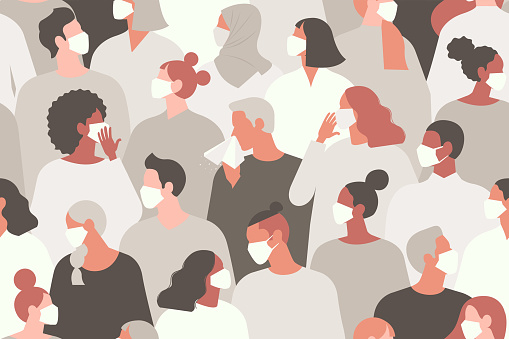As the Covid-19 coronavirus pandemic spirals out of control across much of the United States, health officials are reconsidering their advice to the general public about who should wear medical style face masks.
Why? Because it turns out that many coronavirus carriers have no symptoms — and so can infect others without realizing it.
“Information that we have pretty much confirmed now is that a significant number of individuals that are infected actually remain asymptomatic. That may be as many as 25%,” CDC Director Dr. Robert Redfield told NPR this week
One month ago, there were 30 confirmed Covid-19 cases in the country. Today there are more than 186,000, and the number of fatalities is approaching 4,000, according to the CDC’s coronavirus information website.
Johns Hopkins University posts somewhat higher numbers: more than 199,000 confirmed cases and 4,361 deaths as of midday Wednesday.
Dr. Anthony Fauci, the top infectious disease expert in the U.S., said he would “lean towards” recommending that the general public wear face masks “if we do not have the problem of taking away masks from the health care workers who need them.”
If federal officials do recommend widespread use of face masks, “it would be a stark reversal from recommendations by the World Health Organization and the CDC, who have said face masks should only be worn by health care workers, those who are sick, and those who are taking care of someone sick,” says CNN.
Surgeon General Dr. Jerome Adams has consistently recommended the public not wear masks, saying they can cause more harm than good. But the new information about infected people without symptoms could change things, he said Wednesday.
On NBC’s “Today” show, Adams offered tips on how wear masks correctly.
“If you’re going to wear a face covering, please try not to touch your face. Please be very, very careful about making sure you don’t touch your face,” he said, adding that people often increase the risk of contracting or spreading infection while simply trying to adjust their masks.
Adams emphasized that increasingly scarce N95 surgical masks should be reserved exclusively for health care who really need them, adding that people without medical training might wear them incorrectly.
And he said that wearing a mask doesn’t reduce the need for social distancing.
“The most important thing you can do is stay at home right now,” Adams said. “And we don’t want people to feel like, ‘Okay, I’m covering my face, so now it’s okay for me to go out in public.’”
Meanwhile, the scarcity of masks has encouraged some people to make their own, CNN reports, adding that JOANN Fabrics and Craft Stores has released a YouTube video showing how to do it.
Chunhuei Chi, director of the Center for Global Health at Oregon State University, told the Los Angeles Times that while surgical and homemade masks don’t filter out particles as effectively as N95 masks, they can still be useful.
But Chi recommends wearing a mask only if you have to be in close contact with people, such as riding a crowded bus or elevator.
“If you are going out for a hike or walk and there are very few people around, you do not need a mask,” he said.



